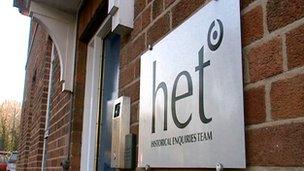Troubles ahead for Historical Enquiries Team?
- Published

The HET was set up to review thousands of unsolved murders committed during the Troubles
The Historical Enquiries Team (HET) was a new concept aimed at dealing with Northern Ireland's violent past.
It was given the task of reviewing more than 3,200 deaths during the Troubles.
While critics have described it as simply another wing of the police, since its creation in 2005 the HET has insisted that it is operationally independent.
Hundreds of families have co-operated with the team on the basis that it was acting independently.
Many families of people killed during the Troubles, including relatives of some RUC officers, did not want former police officers from Northern Ireland involved in the review of their case.
So, the HET has two special teams consisting exclusively of retired officers from other police forces to review those murders. They are also assigned to cases where there are allegations of security force collusion.
The team has also had financial independence - but that will change next month when the new financial year begins.
Request refused
For the first six years of its existence, the HET received £34m from the Northern Ireland Office to carry out its work.
During the past two years, Stormont's department of justice has provided £13m of funding.
The HET has now asked for an additional £10m from the department to continue its work for the next two years.
The BBC understands that the department refused the request. Instead, it asked the PSNI to fund the next two years of the team's work, with that money coming from the police service's financial reserves.
The request for funding for the next two years has been the subject of negotiations between the department and PSNI in recent months.
Dave Cox, director of the HET, said uncertainty about the team's financial future has resulted in experienced staff leaving in recent months.
'Not independent'
He is concerned that loss of experience, and the decision to give funding responsibility to the police, will have serious implications.
"Certainly that will increase the perception that we are not independent at all," Mr Cox said.
"We have a lot of external officers, people who have never worked in Northern Ireland before, to review cases where people don't have confidence and ask for staff who've never worked here before - that works to a degree.
"However, these staff need some degree of certainty before they'll commit to coming to work here. They're people who have to travel on planes over here on a Monday and stay in lodgings, they need to book their flights months in advance, they need to enter into rental agreements. Without some certainty of tenure, I can't get these staff.
"By the end of this financial year I'm looking at losing 12 external staff, which will be two full teams of investigators gone," Mr Cox added.
"The knock-on effect of that will be to slow the whole process down. It will be to alter the ratio of local to external staff, which will upset people who already challenge us around our independence and it will make the whole process much slower and more expensive."
PSNI emergencies
Mr Cox is particularly concerned about the impact the decision will have on those families who do not want former RUC officers or the PSNI to have an active role in their investigations.
"Independence is a crucial issue in those cases," he said. "They certainly wouldn't accept us if we were the PSNI, because that is just the history of this place."
The HET director said the decision could mean many Troubles killings will not be investigated.
He also said the decision to ask the PSNI to divert financial reserves it had hoped to use for emergencies during the next two years is unfair on Chief Constable Matt Baggott.
"The chief constable has now got the task of trying to fund this whilst dealing with all the other current policing issues," Mr Cox said.
"If we're just another policing issue, set against current priorities, it may well be that the finding won't be available long term if other emergencies crop up."
'Unfair burden'
He said some families had been waiting eight years for the HET to get around to investigating their cases and now they were "facing the prospect of further delay".
The HET director added: "The PSNI have got a massive job facing them anyway and this is an additional and unfair burden that they don't need."
The PSNI has not commented on the issue.
The department of justice said discussions about the precise source of funding for the HET are continuing. In a statement, it said HET's work was a priority and it was the department's intention that the team's work would continue.
- Published4 April 2012
- Published3 April 2012
- Published2 February 2012
- Published11 August 2011